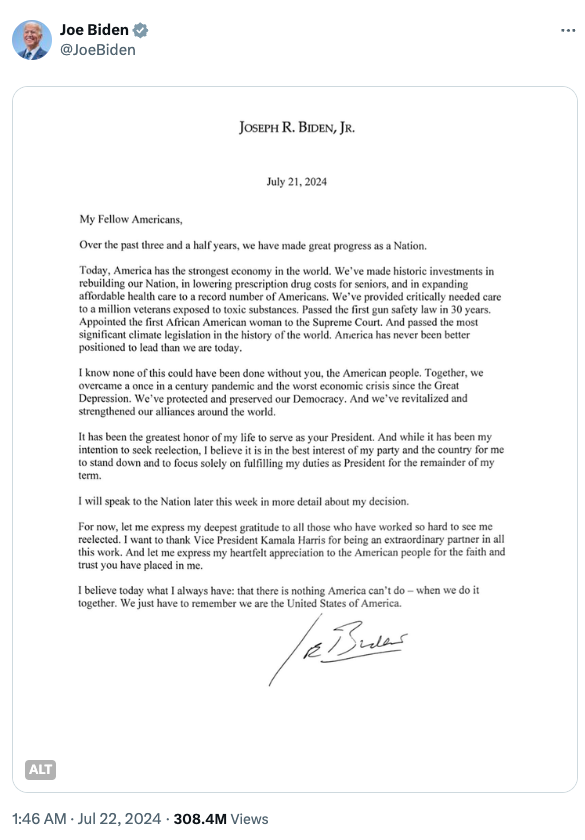
Former United States President Joe Biden concluded his campaign for reelection following a series of political setbacks, capped by a poor debate performance that heightened concerns about his ability to serve a second term. At 81 years old, his decision marks a significant moment in American political history.
Announcement and Endorsement
Biden announced his decision to not seek reelection in a letter shared on his campaign’s Twitter account, confirming he will complete his current term. He plans to address the nation later this week to discuss his decision in detail. In a subsequent message, Biden endorsed Vice President Kamala Harris as his preferred successor, stating his full support for her candidacy.

The decision comes as Biden recovers from COVID-19 in Delaware, with his physician noting significant improvement in his health. The announcement follows less than a month after a debate performance that triggered widespread doubt within his party about his campaign’s viability.
Pressure from Party Leaders
High-profile Democratic leaders, including Speaker Emerita Nancy Pelosi and Senate Majority Leader Chuck Schumer, alongside influential donors such as actor George Clooney, played pivotal roles in persuading Biden to step down. These figures, concerned with Biden’s recent public appearances and campaign direction, exerted pressure both publicly and privately.
The political landscape reacts swiftly to Biden’s withdrawal. Schumer praised Biden for putting “country, party, and future first,” acknowledging the difficulty of his decision. Meanwhile, Rep. Adam Schiff and Sen. Jon Tester, among others, voiced concerns about Biden’s capability to secure a victory in the upcoming election against Donald Trump, indicating a shift towards supporting fresh leadership.
The Race for Succession
With Biden’s endorsement, Vice President Harris emerges as the frontrunner for the Democratic nomination, though other potential candidates like Governors Josh Shapiro, Gretchen Whitmer, and Gavin Newsom are also considered strong contenders. The sudden opening in the Democratic race sets the stage for an expedited and possibly tumultuous selection process, especially with the Democratic National Convention on the horizon.
Biden’s successor will inherit not only his political legacy but also the challenge of addressing economic issues that have been central to the political debate. The new Democratic candidate will need to articulate a compelling economic strategy, particularly in light of the criticisms leveled by Republicans at the recent National Convention regarding inflation and economic management.
| Date | Event |
|---|---|
| July 13 | Biden faces a challenging debate performance. |
| Early July | Discussions among Democrats about Biden’s future. |
| July 16 | Biden announces his withdrawal and endorses Harris. |
| July 18 | Biden to address the nation regarding his decision. |
Joe Biden’s decision to end his presidential campaign introduces a new phase of uncertainty and competition within the Democratic Party. As the political environment adjusts to this major shift, the focus will now turn to Vice President Harris and other potential candidates who will vie to lead the party into the next election against a backdrop of significant national and economic challenges.
Featured image credit: Gage Skidmore via Flickr
Follow us for more breaking news on DMR
